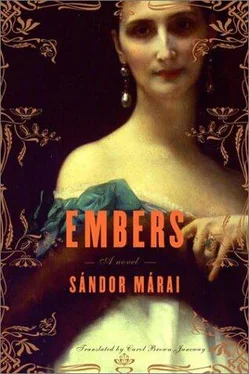He came from the world where soft music lilted through dining rooms and ballrooms and salons, but not the way his friend liked it. It was played to make life sweeter and more festive, to make women’s eyes flash and men’s vanity throw sparks; that was its raison d’ętre throug hout the city, wherever the son of the Officer of the Guards whiled away the nights of his youth. Konrad’s music, on the other hand, didn’t offer forgetfulness; it aroused people to feelings of passion and guilt, and demanded that people be truer to themselves in heart and mind. Such music is upsetting, the son of the Officer of the Guards thought to himself and began rebelliously to whistle a waltz. That year the fashionable composer being whistled by all Vienna was the younger Strauss. He took the key and opened the ancient gate which slowly creaked ajar, crossed the wide vestibule at the foot of the musty, vaulted stairwell lit by oil lamps in uneven glass shades, paused for a moment, and glanced out at the snow-covered garden in the moonlight, looking as if it had been filled in with a stick of white chalk between the dark outlines of things. Everything was peaceful. Vienna was sound asleep under the falling snow. The Emperor was asleep in the Hofburg and fifty million of his subjects were asleep in his lands. The son of the Officer of the Guards felt that this silence was also in part his responsibility, that he, too, was keeping watch over the sleep and safety of the Emperor and his fifty million subjects, even when he was doing no more than wearing his uniform with honor, going out in the evening, listening to waltzes, drinking French red wine, and saying to ladies and gentlemen exactly what they wished to hear from him. He felt that he obeyed a strict regime of laws, both written and unwritten, and that this obedience was also a duty which he fulfilled in the salons just as he fulfilled it in the barracks or on the drill ground. Fifty million people found their security in the feeling that their Emperor was in bed every night before midnight and up again before five, sitting by candlelight at his desk in an American rush-bottomed chair, while everyone else who had pledged their loyalty to him was obeying the customs and the laws. Naturally true obedience required a deeper commitment than t hat prescribed by laws. Obedience had to be rooted in the heart: that was what really counted. People had to be certain that everything was in its place. That was the year that the son of the Officer of the Guards turned twenty-two.
The two of them, young officers in Vienna. The son of the Officer of the Guards climbed the rotted stairs, whistling his waltz half under his breath. Everything in this house smelled a little musty, the stairs, the rooms, and yet it was somehow a pleasant smell, as if the interior retained a lingering odor of fruit preserves. That winter, carnival season broke out like a happy epidemic. Every evening in the white-and-gold salons there was dancing under the flickering tongues of flame in the gaslit chandeliers. Snow kept falling, and coachmen drove pairs of lovers silently through the white air. All Vienna danced in the snowflakes and every morning the son of the Officer of the Guards went to the old indoor riding ring to watch the Spanish riders and their Lippizaners going through their paces. Riders and horses shared a nobility and distinction, an almost guilty ease and rhythm inborn in soul and body. Then, because he was young, he went walking. As he sauntered past the shops in the center of the city in the company of other strollers, he would occasionally be greeted by a waiter or the driver of a hansom cab because he looked so like his father. Vienna and the monarchy made up one enormous family of Hungarians, Germans, Moravians, Czechs, Serbs, Croats, and Italians, all of whom secretly understood that the only person who could keep order among this fantastical welter of longings, impulses, and emotions was the Emperor, in his capacity of Sergeant Major and Imperial Majesty, government clerk in sleeve protectors and Grand Seigneur, unmannerly clod and absolute ruler. Vienna was in high, good mood. The stuffy high-vaulted taverns in the old city served the best beer in the world, and as the bells chimed midday the streets filled with the rich smells of goulash, spreading friendliness and goodwill as if there were eternal peace on earth. Women carried fur muffs and wore hats with feathers, and veils that they pulled down over their faces against the snow, leaving a glimpse of nose and flashing e yes. At four in the afternoon the gaslights were lit in the cafes and coffee with whipped cream was served to the generals and officials at their regular tables while, outside, blushing women shrank into the corners of hired carriages as they raced toward bachelor apartments where the log fires were already lit, for it was carnival and there was an uprising of love throughout the city, as if the agents of some giant conspiracy were goading and inflaming hearts across all levels of society.
In the hour before curtain time in the theaters, vinophiles met discreetly in the cellars of Prince Esterhazy’s palace, tables were being laid for archdukes in the private rooms at the Sacher, and in the hot, smoky rooms of the wine cellar next to St. Stephen’s Cathedral, restless, unhappy Polish gentlemen drank schnapps, for things in their country were not going well. But there were hours that winter in Vienna when it seemed that everyone was happy, which was what the son of the Officer of the Guards was thinking as he contentedly whistled his half-stifled tune. In the vestibule the warmth from the tiled stove reached out to welcome him like a handshake from a trusted friend.
Everything in this city was laid out so generously, and everything was in its perfect place. If the archdukes for their part were a trifle uncouth, the caretakers were the secret beneficiaries in this all-inclusive hierarchy. The servant jumped up from his place next to the stove to take his master’s coat, shako, and gloves even as his other hand was reaching for the bottle of burgundy in its warming place; the son of the Officer of the Guards was in the habit of slowly sipping a glass every night before he went to bed, as if each swallow were a weighty word that distanced him from the frivolous memories of the day and the evening. The man was already following him into Konrad’s dimly lit room, bearing the bottle on a silver tray.
Sometimes they sat talking there until dawn, while stove cooled and the son of the Officer of the Guards worked his way to the end of the bottle. Konrad talked about his reading; Henrik talked about life.
Konrad couldn’t afford life, for him military service was a career involving a rank, a uniform, and a wide range of the most intricate and subtle consequences. The son of the Officer of the Guards sensed that their bond of friendship, fragile and complex in the way of all significant relationships between people, must be protected from the influence of money and any slightest hint of envy or tactlessness. It was not easy. The son of the Officer of the Guards begged Konrad to accept some portion of his fortune, since he truly had no idea what to do with it. Konrad told him he could not accept so much as a filler. And both knew that this was how things must be: the son of the Officer of the Guards could not give Konrad money, and he also had to accept that he would go out in society and live a life appropriate to his rank while Konrad remained at home in Hietzing, ate scrambled eggs five nights a week, and personally tallied his underwear when it was returned from the laundry. But that was not what was important: what was much more alarming was that this friendship, despite the discrepancy in their wealth, must be protected for a lifetime.
Konrad aged quickly. At twenty-five he needed reading glasses. When his friend returned at night from Vienna and the world, smelling of tobacco and perfume, a little tipsy and in a boyish fashion a sophisticate, they talked long and quietly, like conspirators, as if Konrad were a magician sitting by the hearth ruminating on the meaning of existence, while his amanuensis busied himself out there among men, lying in wait to steal life’s secrets. Konrad preferred reading English books, studies in social history and social progress. The son of the Officer of the Guards only read books about horses and great journeys. And because of their friendship, each forgave the other’s original sin: wealth on the one hand and poverty on the other.
Читать дальше












